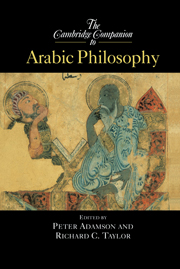Book contents
- Frontmatter
- 1 Introduction
- 2 Greek into Arabic
- 3 Al-Kindī and the reception of Greek philosophy
- 4 Al-Fāarābī and the philosophical curriculum
- 5 The Ismāīlīs
- 6 Avicenna and the Avicennian Tradition
- 7 Al-Ghazālī
- 8 Philosophy in Andalusia
- 9 Averroes
- 10 Suhrawardī and Illuminationism
- 11 Mysticism and philosophy
- 12 Logic
- 13 Ethical and political philosophy
- 14 Natural philosophy
- 15 Psychology
- 16 Metaphysics
- 17 Islamic philosophy and Jewish philosophy
- 18 Arabic into Latin
- 19 Recent trends in Arabic and Persian philosophy
- Select bibliography and further reading
- Index
3 - Al-Kindī and the reception of Greek philosophy
Published online by Cambridge University Press: 28 May 2006
- Frontmatter
- 1 Introduction
- 2 Greek into Arabic
- 3 Al-Kindī and the reception of Greek philosophy
- 4 Al-Fāarābī and the philosophical curriculum
- 5 The Ismāīlīs
- 6 Avicenna and the Avicennian Tradition
- 7 Al-Ghazālī
- 8 Philosophy in Andalusia
- 9 Averroes
- 10 Suhrawardī and Illuminationism
- 11 Mysticism and philosophy
- 12 Logic
- 13 Ethical and political philosophy
- 14 Natural philosophy
- 15 Psychology
- 16 Metaphysics
- 17 Islamic philosophy and Jewish philosophy
- 18 Arabic into Latin
- 19 Recent trends in Arabic and Persian philosophy
- Select bibliography and further reading
- Index
Summary
The previous chapter has given some sense of the enormous impact of the translation movement during the 'Abbāsid caliphate, which rendered Greek works of science and literature into Arabic. The translation of what we would now consider to be properly philosophical works was only a small part of this movement. Translation of philosophy went hand in hand with the translation of more “scientific” texts, such as the medical writings of Galen and the astronomical and mathematical works of Euclid, Ptolemy, and others. Under the 'Abbāsids the most important group of translators, in terms of sheer output and the quality of their translations, was that of the Christian Hunayn ibn Ishāq (808-873 C.E.), and his son Ishāq ibn Hunayn (died 910 C.E.). Hunayn and his school produced many translations, including of works by Plato and Aristotle (especially the logical corpus); particularly important to Hunayn himself were translations of Galen, which formed the basis for Hunayn’s own treatises on medicine.
A second, slightly earlier group was that gathered around the person of Abū Yūsuf Ya‘qū b ibn Ishāq al-Kindī (died about 870 C.E.). Al- Kindī’s circle did not produce as many translations as the Hunayn circle, yet some of the works they did translate were of immense importance in determining the Arabic reception of Greek philosophical thought. It is quite likely that the choice of which texts to translate was guided in part by the philosophical concerns of al-Kindī and his collaborators.
- Type
- Chapter
- Information
- The Cambridge Companion to Arabic Philosophy , pp. 32 - 51Publisher: Cambridge University PressPrint publication year: 2004
- 3
- Cited by

